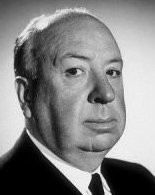
Even my failures make money and become classics a year after I make them
Regisseur * ab 1920 "Zwischentitel-Entwerfer" im Londoner Studio der amerikanischer Filmgesellschaft Famous Players-Lasky * 1922 lernt von George Fitzmaurice Grundlagen der Filmarbeit * ab 1923 Regieassistent * 1924 erste eigenständige Regiearbeiten (The Pleasure Garden & The Mountain Eagle) - bis 1929 dreht neun Stummfilme * 1927-32 unter Vertrag bei British International Pictures (BIP) * 1929 realisiert ersten britischen Tonfilm (Blackmail) * 1930 Gründung von Hitchcock Baker Productions (zu Werbezwecken) * 1934 Beginn seiner internationalen Reputation als Master of Suspense (The Man Who Knew Too Much & The 39 Steps, 1935) * 1938 unterzeichnet Vertrag mit David O. Selznick * 1939 geht mit seiner Familie nach Amerika * dreht Kurzfilme für die britische Library of Information (1941) und für British Ministry of Information (Bon Voyage & Aventure malgache; beide 1944) * 1946 (mit Sidney Bernstein) Gründung der Produktionsfirma Transatlantic Pictures (1949 aufgelöst) * 1954 Beginn langjähriger Zusammenarbeit mit dem Filmkomponisten Bernard Herrmann (bis 1964) * seit 1955 amerikanischer Staatsbürger * Produzent und host der TV-Serien Alfred Hitchcock Presents (1955-62) und The Alfred Hitchcock Hour (1962-65) * einer der bekanntesten Regisseure der Filmgeschichte - Markenzeichen: cameos [Kurzauftritte] in seinen Filmen
"You never have any trouble with him as long as you know your job and do it. Hitchcock insists on perfection. He has no patience with mediocrity on the set or at a dinner table. There can be no compromise in his work, his food, or his wines." Robert Burks
Aufgewachsen in einer streng katholischen Londoner Familie, liebt Hitchcock früh das damals noch sehr junge Kino. 1920 sichert er sich beim neu gegründeten Studio Lasky einen Job als Titelzeichner und darf 1925 seinen ersten Film inszenieren - in den Babelsberger UFA-Studios. Sein Talent für "Suspense" wird schnell sichtbar, mit zehn Stumm- und 15 Tonfilmen wird er in England zum unbestrittenen Regiestar, bevor er 1939 kurz vor Ausbruch des Krieges mit seiner Familie nach Hollywood geht. Hitchcock steigt schnell zum weltweit führenden Regisseur auf - neben seinem hoch entwickelten Sinn für Dramaturgie und Bilder ist es vor allem sein psychologisches Gespür, das ihn zu einem Regie-Genie werden lässt. Der Perfektionist lässt sich von seiner Frau Alma beraten. 54 Jahre ist er mit ihr glücklich verheiratet, Experten sehen in dieser Stabilität eine der Grundlagen für "Hitchs" außergewöhnliches Schaffen. Er dreht fast jedes Jahr einen Film. Zu seinen besten zählen "Das Fenster zum Hof" (1954), "Vertigo" (1958), "Der unsichtbare Dritte" (1959), "Psycho" (1960) und "Die Vögel" (1963). Obwohl Alfred Hitchcock zu den innovativsten und erfolgreichsten Regisseuren der Filmgeschichte zählt, hat er zeitlebens nie einen Oscar erhalten. [MDR, April 2010]
SOUND FILMS
Blackmail
(Erpressung, 1929-GB) Thriller mit Anny Ondra, Sara Allgood,
John Longden | erster britischer Tonfilm - als Stummfilm begonnen, dann
mit Dialogen und Geräuschen ergänzt
Juno and the Paycock (1930-GB) Drama
mit Sara Allgood, Edward Chapman
Murder ! (Mord - Sir John greift ein, 1930-GB)
Thriller mit Herbert Marshall, Norah Baring
+ Mary (1930) deutsche Version mit Alfred
Abel, Olga Tschechowa
The Skin Game (Bis aufs Messer, 1930/31-GB)
Drama mit Edmund Gwenn, Jill Esmond
Number Seventeen (Nummer Siebzehn, 1931-GB)
Krimi/thriller mit Leon M. Lion, Anne Grey
Rich and Strange (Endlich sind wir reich,
1932-GB) Drama mit Henry Kendall, Joan Barry
Waltzes from Vienna (1933-GB) Musikkomödie
mit Jessie Matthews, Esmond Knight, Edmund Gwenn
The Man Who Knew Too Much (1934-GB)
Thriller mit Nova Pilbeam, Peter Lorre, Leslie Banks, Edna Best
# The 39 Steps (Die 39 Stufen, 1935-GB) (Roman von John Buchan) (01-03; 3506)
The Secret Agent (Geheimagent, 1935-GB)
Thriller mit John Gielgud, Madeleine Carroll, Robert Young
# Sabotage (Sabotage, 1936-GB) (Roman The Secret Agent von Joseph Conrad) (04-?; 3612)
Young and Innocent (Jung und unschuldig,
1937-GB) Krimi mit Nova Pilbeam, Derrick de
Marney
The Lady Vanishes (Eine Dame verschwindet,
1937-GB) Thriller mit Margaret Lockwood, Michael
Redgrave
Jamaica Inn (Riff-Piraten, 1938-GB)
Abenteuer mit Charles Laughton, Maureen O’Hara
Rebecca (Rebecca, 1939-USA)
Thriller/melodram mit Laurence Olivier, Joan Fontaine, George
Sanders
# Foreign Correspondent (Mord * Der Auslandskorrespondent, 1940-USA) (4008)
# Mr. & Mrs. Smith (Mr. und Mrs. Smith, 1940-USA) (4101)
# Suspicion (Verdacht, 1941-USA) (Roman von Francis Iles=Anthony Berkeley) (02-05; 4111)
# Saboteur (Saboteure, 1941/42-USA) (12-02; 4204)
# Shadow of a Doubt (Im Schatten des Zweifels, 1942-USA) (08-10; 4301)
Lifeboat (Das Rettungsboot, 1943-USA)
Kriegsdrama mit Tallulah Bankhead, William Bendix
Spellbound (Ich kämpfe
um Dich, 1944-USA) Psychothriller mit Ingrid
Bergman, Gregory Peck
Notorious (Berüchtigt, 1945/46-USA
* R: AH, B: Ben Hecht, K: Ted Tetzlaff, M: Roy Webb, D: Cary Grant, Ingrid
Bergman) 101m-Thriller
The Paradine Case (Der
Fall Paradin, 1946/47-USA) Gerichtsdrama
mit Gregory Peck, Ann Todd, C. Laughton
Rope (Cocktail für eine Leiche, 1948-USA)
Krimi/Thriller mit James Stewart, John Dall, Farley Granger
# Under Capricorn (Sklavin des Herzens, 1948-GB * Ingrid Bergman, Joseph Cotten, Michael Wilding) (Roman von Helen Simpson) (07-11; 4904-BBFC)
Stage Fright (Die rote
Lola, 1949-GB) Thriller mit Jane Wyman, Marlene
Dietrich, Michael Wilding, R. Todd
Strangers on a Train
(Verschwörung im Nordexpreß, 1950-USA; R: AH, B: R. Chandler,
C. Ormonde; W. Cook, K: Robert Burks, M: Dimitri Tiomkin, D: Farley Granger,
Ruth Roman, Robert Walker) 92/101m-Thriller /Roman
von Patricia Highsmith/
# I Confess (Ich beichte, 1952-USA;
R: AH, B: George Tabori, William Archibald, K: Robert Burks, M: Dimitri
Tiomkin, D: Montgomery Clift, Anne Baxter) 91/5m-Thriller
# Dial M for Murder (1953-USA) (Bühnenstück von Frederick Knott) (08-09; 5405)
Rear Window (Das Fenster zum Hof, 1953/54-USA)
Thriller mit James Stewart, Grace Kelly, Wendell Corey
To Catch a Thief
(Über den Dächern von Nizza, 1954-USA) Krimikomödie
mit Cary Grant, Grace Kelly
The Trouble with Harry
(Immer Ärger mit Harry, 1954-USA; R: AH, B: John Michael
Hayes, K: Robert Burks, M: Bernard Herrmann, D: Edmund Gwenn, John Forsythe,
Shirley MacLaine) 99m-Schwarze Komödie /Roman
von John Trevor Story/
# The Man Who Knew Too Much (Der
Mann, der zuviel wußte, 1955-USA; R: AH, B: John Michael
Hayes, K: Robert Burks, M: Bernard Herrmann, D: James Stewart, Doris Day)
112/20m-Thriller
# The Wrong Man (Der falsche Mann, 1956-USA;
R: AH, B: Maxwell Anderson, Angus MacPhail, K: Robert Burks, M: Bernard
Herrmann, D: Henry Fonda, Vera Miles) 105m-Krimidrama
Vertigo (Vertigo - Aus
dem Reich der Toten, 1957-USA; R: AH, B: Alec Coppel,
Samuel A. Taylor, K: Robert Burks, M: Bernard Herrmann, D: James Stewart,
Kim Novak) 128m-Psychothriller /Roman von
Pierre Boileau & Thomas Narcejac/
North by Northwest (Der unsichtbare
Dritte, 1958-USA * R: AH, B: Ernest Lehman, K: Robert
Burks, M: Bernard Herrmann, D: Cary Grant, Eva Marie Saint, James Mason)
136m-Thrillerkomödie
# Psycho (Psycho, 1959/60-USA; R: AH, B: Joseph Stefano, K: John L. Russell, M: Bernard Herrmann, D: Anthony Perkins, Vera Miles, John Gavin & Janet Leigh) 109m-Psychothriller (Roman von Robert Bloch)
The Birds (Die Vögel,
1962-USA * R: AH, B: Evan Hunter, K: Robert Burks, D:
Rod Taylor, Tippi Hedren, Jessica Tandy, Suzanne Pleshette) 120m-Horrorthriller
# Marnie (Marnie, 1963/64-USA) (Roman von Winston Graham)
Torn Curtain (Der zerrissene Vorhang,
1965/66-USA) Thriller mit Paul
Newman, Julie Andrews, Lila Kedrova
Topaz (Topas, 1968/69-USA)
Spionagethriller mit Frederick Stafford, Dany Robin
# Frenzy (Frenzy, 1971-GB; R: AH, B: Anthony Shaffer, K: Gilbert Taylor, M: Ron Goodwin, D: Jon Finch, Alec McCowen, Barry Foster) 116m-Psychothriller (Roman von Arthur La Bern) (08-10; 7205)
# Family Plot (Familiengrab, 1975-USA * Karen Black, Bruce Dern, Barbara Harris, William Devane) (Roman von Victor Canning) (7604)
AWARDS
New
York Film Critics Circle Award für The Lady Vanishes
(beste Regie, 1938)
Silberne Muschel für Vertigo [Filmfestival
San Sebastián 1958]
Silberne Muschel für North by Northwest [Filmfestival
San Sebastián 1959]
Irving G. Thalberg Memorial Award (1968)
Life Achievement Award [Directors Guild of America, 1968]
National Board of Review Award für Topaz
(beste Regie, 1969)
Cecil B. DeMille Award [Golden Globes 1972]
Life Achievement Award [American Film Institute - 1979]
BOOKS
Sidney Gottlieb [Hg.]: Hitchcock on Hitchcock. London: Faber
and Faber, 1995
Serge Kaganski: Alfred Hitchcock. Paris: Hazan, 1997
Charles Barr: English Hitchcock. Moffat: Cameron & Hollis,
1999
Donald Spoto: Alfred Hitchcock und seine Filme. München: Heyne,
1999
Enno Patalas: Alfred Hitchcock. München: dtv, 1999
Jean Douchet: Hitchcock. Paris: Cahiers du Cinéma, 1999
Kathleen Kaska: The Alfred Hitchcock Triviography and Quiz Book.
Los Angeles: Renaissance Books, 1999
Ken Mogg: The Alfred Hitchcock Story. Dallas: Taylor, 1999
Lars-Olav Beier, Georg Seeßlen (Hg.): Alfred Hitchcock. Berlin:
Bertz, 1999
Ronald M. Hahn, Rolf Giesen: Alfred Hitchcock - Der Meister der Angst.
München: Droemer Knaur, 1999
Bill Krohn: Hitchcock at Work. London: Phaidon, 2000
Patrick Brion: Hitchcock: biographie, filmographie illustrée, analyse
critique. Paris: La Martinière, 2000
Sabine Lenk [Red.]: Obsessionen – Die Alptraum-Fabrik des Alfred Hitchcock.
Marburg: Schüren, 2000
Susan Smith: Hitchcock: Suspense, Humour and Tone. London: British
Film Institute, 2000
Robin Wood: Hitchcock's Films Revisited. Revised Edition. New
York: Columbia University Press, 2002
Thomas M. Leitch: The Encyclopedia of Alfred Hitchcock. New York:
Checkmark Books, 2002
Nicholas Haeffner: Alfred Hitchcock. Harlow: Pearson Longman,
2005
Thilo Wydra: Alfred Hitchcock. Frankfurt am Main: Suhrkamp, 2010
John Russell Taylor: Hitch: The Life and Times of Alfred Hitchcock. [?]: A&C Black, 2013
Mark Osteen: Hitchcock and Adaptation: On the Page and Screen. [?]: Rowman & Littlefield, 2014 > 352 Seiten
Stephen Whitty: The Alfred Hitchcock Encyclopedia. [?]: Rowman & Littlefield, 2016 > 548 Seiten
 Jane E. Sloan: Alfred Hitchcock: A Filmography and Bibliography. Berkeley: University of California Press, 1995
Jane E. Sloan: Alfred Hitchcock: A Filmography and Bibliography. Berkeley: University of California Press, 1995Here is the definitive resource for fans and students of the films of Alfred Hitchcock. For the paperback edition, Jane Sloan has updated the annotated bibliography and indexes. > 628 pp.
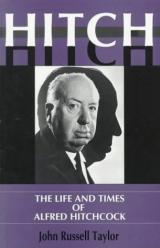 John Russell Taylor: Hitch: The Life and Times of Alfred Hitchcock. New York: Da Capo Press, 1996
John Russell Taylor: Hitch: The Life and Times of Alfred Hitchcock. New York: Da Capo Press, 1996One of cinema's greatest directors, a virtuoso visual artist, and a genius of the suspense genre, Alfred Hitchcock (1899–1980) is universally known for such masterpieces as Strangers on a Train, Rear Window, Vertigo, North by Northwest, Psycho, and The Birds. The author, a distinguished film critic and friend of Hitchcock's, enjoyed his full cooperation. Based on numerous interviews, with photos from the private family albums, and an in-depth study of the making of his last film, this biography of the director is as intriguing, revealing, perverse, and entertaining as any Hitchcock classic. > 342 pp.
 Donald Spoto: The Dark Side of Genius: The Life of Alfred Hitchcock. New York: Da Capo Press, 1999
Donald Spoto: The Dark Side of Genius: The Life of Alfred Hitchcock. New York: Da Capo Press, 1999This is the definitive life story of Alfred Hitchcock, the enigmatic and intensely private director of Psycho, Vertigo, Rear Window, The Birds, and more than forty other films. While setting forth every stage of Hitchcock’s long life and brilliant career, Donald Spoto also explores the roots of the director’s obsessions with blondes, food, murder, and idealized love - and he traces the incomparable, bizarre genius from Hitchcock’s English childhood through the golden years of his career in America as one of the greatest directors in the history of filmmaking. > 608 pages, paperback
 Robert A. Harris, Michael S. Lasky: The Complete Films of Alfred Hitchcock. New York: Citadel Press, 2002
Robert A. Harris, Michael S. Lasky: The Complete Films of Alfred Hitchcock. New York: Citadel Press, 2002Alfred Hitchcock remains the undisputed master of terror and suspense and a visionary who revolutionized the art of filmmaking. The director of masterpieces such as Vertigo, Psycho, Rear Window, The Birds, and Strangers on a Train, he wove classic stories through intelligent plots, witty dialogue, and a spoonful of mystery and murder. The Complete Films of Alfred Hitchcock is a tribute to the more than fifty years he spent as a film director, from his 1922 silent film The Pleasure Garden to his final 1976 film Family Plot. It also covers the years of his popular television show, Alfred Hitchcock Presents, which ran from 1955-1962 and showcased Hitchcock’s legendary black humor. Complete with more than 450 black and white stills from his many films and a text That examines the background of each production, this is the ultimate portrait of the movie genius that was both loved and hated. > 256 pages, paperback
 Howard Maxford: The A-Z of Hitchcock. London: B.T. Batsford, 2003 [paperback]
Howard Maxford: The A-Z of Hitchcock. London: B.T. Batsford, 2003 [paperback]For the legion of Alfred Hitchcock's fans: a totally new reference book on the career of one of finest and best loved directors in history. This unique compendium covers his entire career in a user-friendly, easy-reference, A-to-Z format for the first time. Each entry includes a complete film synopsis with a detailed critique; cast and credit listings; video, laserdisc and DVD availability; and soundtrack availability. Plus, there's inside info on Hitchcock's trademark appearance in each film, all his television work, and unrealized and unfinished films, as well as biographies for all Hitchcock's lead actors, key cinematographers, technicians, composers, and special effects people. Illustrated throughout. > 304 pp. - includes bibliographical references and index
Hitchcock's name is synonymous with suspense - that is to say, masterful, spine-tingling, thrilling, shocking, excruciating, eye-boggling suspense. With masterpleces such as Rebecca, Vertigo, Rear Window, and Psycho, Alfred Hitchcock (1899-1980) fashioned an extremely original approach to filmmaking that is oft imitated though never equaled; his ability to enthrall and frighten with careful pacing, subtlety, and suggestiveness earned him a prestigious reputation which grows more powerful as time goes by. He is and will always remain the master of cinematic suspense. This book, which traces his life and career, from his earliest silent films to his last picture in 1976, also includes a special bonus that Hitch fans will especially enjoy: an illustrated and annotated list of each of his cameos. > 191 pp., ill (some col.), ports. (some col.), paperback
 Sidney Gottlieb [Hg.]: Alfred Hitchcock: Interviews. Jackson: University Press of Mississippi, 2003
Sidney Gottlieb [Hg.]: Alfred Hitchcock: Interviews. Jackson: University Press of Mississippi, 2003Even twenty years after his death and nearly fifty or more years after his creative peak, Alfred Hitchcock (1899-1980) is still arguably the most instantly recognizable film director in name, appearance, vision, and voice. Long ago, through a combination of timing, talent, genius, energy, and publicity, he made the key transition from proper noun to adjective that confirms celebrity and true stature. It is a rare filmwatcher indeed who cannot define "Hitchcockian."As the director of such films as Psycho, North by Northwest, Spellbound, Vertigo, Rear Window, To Catch a Thief, Notorious, and The Birds, Hitchcock has become synonymous with both stylish, sophisticated suspense and mordant black comedy. He was one of the most interviewed directors in the history of film. Among the hundreds of interviews he gave, those in this collection catch Hitchcock at key moments of transition in his long career--as he moved from silent to sound pictures, from England to America, from thrillers to complex romances, and from director to producer-director.These conversations dramatize his shifting attitudes on a variety of cinematic matters that engaged and challenged him, including the role of stars in a movie, the importance of story, the use of sound and color, his relationship to the medium of television, and the attractions and perils of realism. His engaging wit and intelligence are on display here, as are his sophistication, serious contemplation, and playful manipulation of the interviewer > 280 pp.
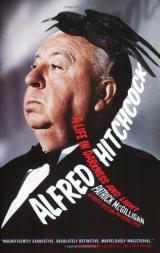 Patrick McGilligan: Alfred Hitchcock: A Life in Darkness and Light. New York: HarperCollins, 2004
Patrick McGilligan: Alfred Hitchcock: A Life in Darkness and Light. New York: HarperCollins, 2004In a career that spanned six decades and more than sixty films, Alfred Hitchcock became the most widely recognized director who ever lived. His films -- including The 39 Steps, Notorious, Rear Window, Vertigo, Psycho, and The Birds -- set new standards for cinematic invention and storytelling élan. Since his death, Hitchcock has become crystallized in the public imagination as the macabre Englishman, the sexual obsessive, the Master of Suspense. But this remarkable biography draws on prodigious new research to restore Hitchcock the man -- the ingenious craftsman, the avid collaborator, the constant trickster, provocateur, and romantic. Like Hitchcock's best films, Patrick McGilligan's life of Hitchcock is a drama full of revelation, graced by a central love story, dark humor, and cliff-hanging suspense: a definitive portrait of the most creative, and least understood, figure in film history. > 864 pp.
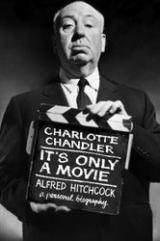 Charlotte Chandler: It's Only a Movie: Alfred Hitchcock, a Personal
Biography. New York: Simon & Schuster, 2005
Charlotte Chandler: It's Only a Movie: Alfred Hitchcock, a Personal
Biography. New York: Simon & Schuster, 2005In his films, Alfred Hitchcock found the perfect expression for his fantasies, and he shared those fantasies with the world in such classics as The 39 Steps, The Lady Vanishes, Rebecca, Shadow of a Doubt, Notorious, Strangers on a Train, Rear Window, The Man Who Knew Too Much, To Catch a Thief, North by Northwest, Vertigo, Psycho, and The Birds. In It's Only a Movie, Charlotte Chandler draws from her extensive conversations with Hitchcock, frequently revealing unknown facts and unexpected insights into the man, the director, and his films. Author of acclaimed biographies of Groucho Marx, Federico Fellini, and Billy Wilder, Charlotte Chandler spent several years with Hitchcock discussing his life and his amazing career. She also talked with his wife, Alma, and daughter, Pat, as well as many of the screen legends who appeared in his films, including Cary Grant, Ingrid Bergman, James Stewart, Grace Kelly, Joan Fontaine, Laurence Olivier, Michael Redgrave, John Gielgud, Gregory Peck, Henry Fonda, Tippi Hedren, James Mason, Eva Marie Saint, Kim Novak, Anthony Perkins, Janet Leigh, and others. The result is an intimate yet expansive portrait of a unique artist who, from the 1920s through the 1970s, created many of history's most memorable films. A quarter-century after his death, Hitchcock's distinctive profile remains an instantly recognizable icon to millions, while his films continue to grow in popular appeal and critical esteem. Chandler introduces us to the real Hitchcock: a devoted family man, practical joker, and Englishman of Edwardian sensibilities who was one of the great masters of cinematic art. > eBook, 368 pages
Humorvoll, klug, verschmitzt, ironisch, keiner Pointe und Anekdote abhold, so präsentierte sich Alfred Hitchcock in den ausführlichen Interviews, die François Truffaut mit ihm führte und in denen er 500 Fragen beantwortete. Entstanden ist daraus das vielleicht aufschlussreichste Filmbuch überhaupt, eine Hommage an Hitchcock und an das Filmemachen. > XI, 399 S. : Ill. * Filmogr. und Literaturverz. S. 362 - 391. - Orig.-Ausg. auch u.d.T.: Hitchcock - Truffaut. - Bereits unter der Bandnr. 19/14 erschienen. Die Bildzahl wurde für diese Taschenbuchausg. reduziert.
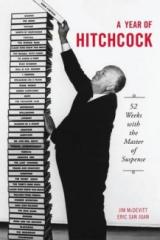 Jim McDevitt, Eric San Juan: A Year of Hitchcock: 52 Weeks with the Master of Suspense. Lanham: Scarecrow Press, 2011
Jim McDevitt, Eric San Juan: A Year of Hitchcock: 52 Weeks with the Master of Suspense. Lanham: Scarecrow Press, 2011Alfred Hitchcock's career spanned more than five decades, during which he directed more than 50 films, many of them indisputable classics: Notorious, Strangers on a Train, Rear Window, Vertigo, North by Northwest, and Psycho, among others. In A Year of Hitchcock: 52 Weeks with the Master of Suspense, authors Jim McDevitt and Eric San Juan provide a comprehensive examination of Hitchcock's film-to-film development, spanning from the beginning of his career in silents to his final film in 1976, including his work on two French propaganda shorts he directed during World War II and segments he directed for Alfred Hitchcock Presents. Organized into 52 chapters and arranged in chronological order, the book invites readers to spend a year with the director's most notable works, all of which are available on DVD. Each film is examined in the context of Hitchcock's career, as the authors consider the themes central to his work; discuss each film's production; comment on the cast, script, and other aspects of the film; and assess the film's value to the Hitchcock viewer. From The Lodger to Family Plot, 68 works directed by Hitchcock are analyzed. Each analysis is supplemented by key film facts, trivia, awards, a guide to his cameos, a filmography, and a listing of available DVD releases. Whether readers decide to undertake the journey through his films one week at a time or pick and choose at their discretion, A Year of Hitchcock will open the eyes of any viewer who wants to better understand this director's evolution as an artist. > xi, 413 p. : ill.
 Thomas Leitch & Leland Poague [Hg.]: A Companion to Alfred Hitchcock. Chichester: Wiley, 2011
Thomas Leitch & Leland Poague [Hg.]: A Companion to Alfred Hitchcock. Chichester: Wiley, 2011The most comprehensive volume ever published on Alfred Hitchcock, covering his career and legacy as well as the broader cultural and intellectual contexts of his work.
> Contains thirty chapters by the leading Hitchcock scholars.
> Covers his long career, from his earliest contributions to other directors’ silent films to his last uncompleted last film.
> Details the enduring legacy he left to filmmakers and audiences alike